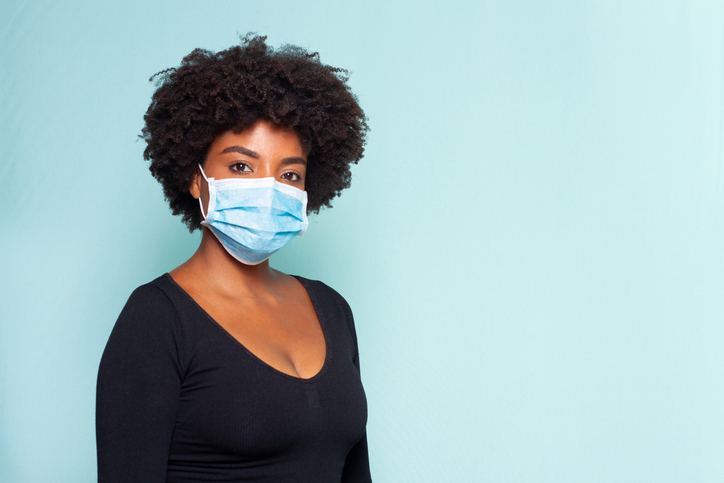Wearing a Mask May Reduce The Dose and Severity of COVID-19 Exposure

By Joy Stephenson-Laws, J.D., Founder
As we’ve seen with the novel coronavirus, some people may get gravely ill and need supplemental oxygen while others experience very mild symptoms, similar to the common cold or minor stomach bug. Age and having preexisting conditions such as obesity or lung or heart disease can play a role in how sick you will be if you contract COVID-19, however, when comparing some cases, it’s quite puzzling as to why one person gets very sick and the other does not.
For example, take a look at the story of this 23-year-old man who had no underlying health conditions when he got COVID-19.
“After nearly 80 days of fighting COVID-19, sedated, flat on his back with a ventilator tube pushing air down his throat and into his lungs, then a stint in rehab, Avery is walking and standing again, though a bit shaky and leaning on a walker for support,” according to the report.
Then there are many people his age or even older that experience mild symptoms, do not require hospitalization or don’t even know that they have COVID-19 because they are asymptomatic and have not been tested.

It is possible that an explanation for this is due to certain immune system differences.
“Across two new studies, researchers have identified a crucial immune system mechanism that could help explain why the virus is so lethal - but only for some people,” according to one report.
Type I interferons (IFNs) are proteins that infected cells make in order to stop the spread of whatever may be infecting them. Some people have issues with these proteins.
“One of the new studies showed that more than 10 percent of healthy people who ended up with severe COVID-19 symptoms have antibodies that attack the patient's own IFNs and stop them properly fighting the SARS-CoV-2 virus. The other study looked at patients who were hospitalised with severe symptoms - some of them still in their 20s - and found that at least another 3.5 percent of carried genetic mutations that stop IFNs working properly.”
We may not be able to control whether we have these mutations or not, but wearing a mask may make a world of difference. According to a recent study published in the Journal of General Internal Medicine, the severity of coronavirus infection may greatly depend on whether you wear a face mask or not.
Face Masks May Reduce The Dose of Virus You May Be Exposed To“Although the benefit of population-level public facial masking to protect others during the COVID-19 pandemic has received a great deal of attention, we discuss for one of the first times the hypothesis that universal masking reduces the ‘inoculum’ or dose of the virus for the mask-wearer, leading to more mild and asymptomatic infection manifestations,” according to the study report.
“Asymptomatic infections may be harmful for spread but could actually be beneficial if they lead to higher rates of exposure. Exposing society to SARS-CoV-2 without the unacceptable consequences of severe illness with public masking could lead to greater community-level immunity and slower spread as we await a vaccine.”
This is a very interesting approach. And in my opinion, it is very useful information for people who are older and very fearful about contracting COVID-19. Of course, we want to avoid contracting and spreading the virus, however, if we do get coronavirus, we may be able to have a mild case of the virus if we are wearing a face mask when we contract it. So despite all the varying opinions on whether wearing a face mask in public is necessary or not, I think it is safe to conclude that wearing a mask at all times in public spaces is beneficial for our health.
This virus has caused so much loss of control in our lives, but wearing a mask is a great way to gain back some of that control. Of course, in addition to wearing face masks, remember to practice social distancing, wash your hands frequently, stay home if you don’t feel well and avoid large gatherings.
For information on different types of face masks, check out this pH Labs blog. And click here to learn how to combat “maskne.”
As Always, Be Proactive By Protecting Your Immune System
There is a lot you can do to help your immune system work at its best. This includes eating healthily, exercising regularly, getting sufficient good quality sleep, avoiding smoking, drinking alcohol in moderation (if at all) and managing stress levels.
For more information on how you can keep your immune system in top shape, read here.
Finally, maintaining nutrient balance is key. So many of us have nutritional deficiencies and imbalances and don’t even know it. Taking routine nutrient tests will identify these issues and then we can work with a competent healthcare professional on making the necessary dietary changes and possibly take quality supplements.
Mask up and enjoy your healthy life!
Disclaimer: This article is not intended to provide medical advice. Please consult with your doctor or another competent healthcare practitioner to get specific medical advice for your situation.
The pH professional health care team includes recognized experts from a variety of health care and related disciplines, including physicians, attorneys, nutritionists, nurses and certified fitness instructors. This team also includes the members of the pH Medical Advisory Board, which constantly monitors all pH programs, products and services. To learn more about the pH Medical Advisory Board, click here.







